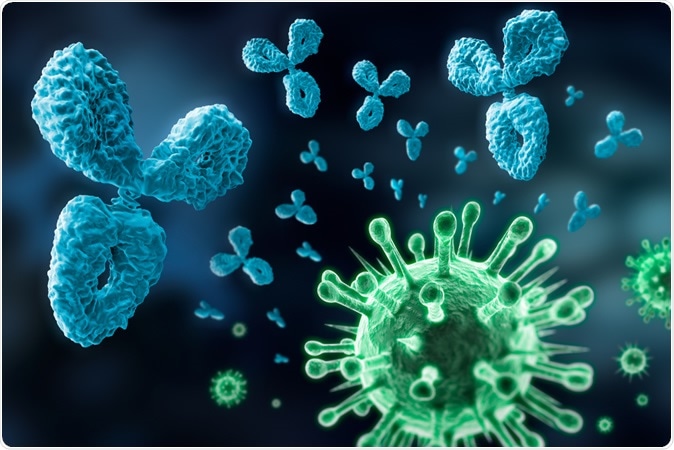The coronavirus pandemic is actively spreading across the globe, infecting more than 9 million individuals. Many countries have high numbers of infections, with some believing that being infected with the virus may provide lasting immunity.
Now, a new study shows that the levels of antibodies found in recovered coronavirus disease (COVID-19) patients declined sharply in just two to three months after infection for both symptomatic and asymptomatic patients.

Antibody and virus - visual concept of the immune system. Illustration Credit: Peter Schreiber / Shutterstock
Antibodies faded quickly
A team of researchers at the Chongqing Medical University, a branch of the Chinese Center for Disease Control and Prevention, has found that the antibodies the body developed against the severe acute respiratory syndrome coronavirus 2 (SARS-CoV-2) faded quickly, raising concerns if being infected would mean a lasting immunity against the viral infection.
The study, published in the journal Nature Medicine, looked at 37 symptomatic and 37 asymptomatic patients who were infected with the coronavirus disease. The findings of the study showed than more than 90 percent of the participants in both groups manifested rapid declines in the levels of SARS-CoV-2-specific immunoglobulin G (IgG) antibodies within just two to three months after the onset of infection.
The researchers also found that within eight weeks, antibodies against the novel coronavirus could not be detected in 40 percent of the asymptomatic patients, and 12.8 percent of those who developed symptoms.
Convalescent plasma
The patients included in the study were among 2,088 people who tested positive for COVID-19 due to close contact with confirmed cases in the Wanzhou district in China. Of the patients who tested positive, 60 were asymptomatic in the preceding two weeks but had been admitted to isolation. About 23 of those patients developed mild symptoms after, leaving 37 participants.
On the other hand, the control group involved 37 mildly symptomatic patients who matched the asymptomatic group by factors such as comorbidity, sex, and age.
The study also reveals that there is a decline in specific neutralizing antibodies, which are antibodies that can neutralize a virus on their own, without the help of other immune system elements. Though the declines were not as significant as with Immunoglobulin G (IgG), it still shows that all types of antibodies may decline overtime even after being infected with the coronavirus.
The team discovered declines in specific neutralizing antibodies in 81 percent of the asymptomatic group and 62 percent in the symptomatic group. The median declines in antibody levels were 8.3 percent in the asymptomatic group and about 11.7 percent in those who developed symptoms. Further, the findings show that the IgG levels were markedly elevated in patients who are asymptomatic in both the acute and convalescent phases of infection.
Study implications
Though the study utilized a small sample size, the researchers hope that the findings may help governments decide on allowing those with antibodies to travel to other countries. Antibody testing should be a basis for travel permissions, especially that the findings show that they may still contract the virus.
The researchers added that it is unsafe to assume that all who recovered from the infection are immune to the virus, showing that re-infection may still happen in the future.
Using antibody tests may not be effective in stemming the spread of the virus since the antibodies decline in just a few months. The study highlights the long-lasting theory that the infection does not provide long-lasting immunity in people who were infected.
“These data suggest that asymptomatic individuals had a weaker immune response to SARS-CoV-2 infection. The reduction in IgG and neutralizing antibody levels in the early convalescent phase might have implications for immunity strategy and serological surveys,” the researchers wrote in the paper.
A virology professor at the University of Hong Kong who was not part of the research team said that the study does not contradict the possibility that other parts of the immune system could offer some protection against the novel coronavirus.
He explained that immune cells memorize how to cope with a foreign invade, such as a virus, when first infected and could provide effective protection in case the person contracts the virus again.
“The finding in this paper doesn’t mean the sky is falling,” he added, noting that the number of the patients involved in the study was small. Further research is still needed to better understand if the immune system could protect against the virus after the initial infection.
Journal reference:
- Long, Q., Tang, X., Shi, Q., Li, Q., Deng, H., Yuan, J. et al. (2020). Clinical and immunological assessment of asymptomatic SARS-CoV-2 infections. Nature Medicine. https://www.nature.com/articles/s41591-020-0965-6